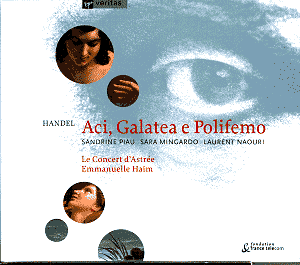Aci, Galatea e Polifemo is a cantata for
three singers written in 1708 when Handel was in Naples. While
the story is the same as the English Acis and Galatea, Handel
recycled very little for the English Acis. He did, however, adapt
some of this music for other operas.
This work is relatively demanding on the singers.
The role of Polifemo is extremely wide in range, from treble A
down to a very low D, but bass Laurent Naouri is in his element
here, and covers this range with ease. The other two singers,
soprano Sandrine Piau and alto Sara Mignardo, are very good, though
their overuse of vibrato can be annoying. This is especially the
case when they sing together and their vibrato is out of phase.
It's a bit of a shame, because Sara Mignardo has one of the richest,
most intense alto voices I have heard in recent years, and her
excessive vibrato detracts from the quality of her voice.
This work features some vintage Handel, with
some fine, moving arias. Qui l'augel da pianta in pianta is
a nearly perfect piece of music, with a delightful flute opening,
then the remainder of the instruments joining, as if it were a
concerto, and finally the ethereal soprano voice of Sandrine Piau
floating over the instruments. This long aria - nearly 11 minutes
- is a perfect example of Handel's brilliant composition for voice,
and while very demanding is performed brilliantly.
Bass Laurent Naouri shows his range in the extremely
demanding aria Fra l'ombre e gl'orrori, where he slides
from tenor to bass with apparent ease (though I'm sure this is
much more difficult than he makes it sound). Handel clearly had
a fine bass when he composed this work, and used it as a showcase.
But this recording suffers from some weaknesses
in sound. At times it sounds like a live recording, with voices
or instruments fading away or with voices unbalanced in duets.
The opening duet, Sorge il di, shows these problems from
the beginning, as the two voices sound as if they came from other
recording locations and were overdubbed. The reverb sounds different
between the voices, and they carry a somewhat artificial sound
over the instruments. Qui l'augel da pianta in pianta has
problems, with the voice at times being overwhelmed by the instruments.
The aria for bass and continuo, Impara, ingrata, impara,
is poorly balanced as well: the harpsichord sounds as though it
is in another room, and the balance between the cello and harpsichord
is poor.
Instrumentally this music shines. The ensemble
plays with precision and verve, and the instruments are balanced
perfectly. The opening overture (taken from the Concerto Grosso
no. 4 in F major) whets the listeners' appetite with its bouncy
rhythms and almost perfect mix. The obbligato instruments, such
as the oboe in several of the arias, are recorded almost perfectly.
This recording is very good, and the work itself
is excellent, but if one is not a fan of excessive vibrato it
can grate. The minor sound problems are easily forgotten, though,
and one can easily become carried away by this spectacular work
and forget its minor flaws.
Kirk McElhearn
